- Home
- J. R. Ellis
The Royal Baths Murder Page 15
The Royal Baths Murder Read online
Page 15
Sinclair looked at him. ‘Yes, but I think you can see that deep down I still cared for him, despite everything. I could never have killed him,’ he repeated. ‘I was just hoping to keep all this personal history out of the picture.’
‘Not wise; we usually get there in the end,’ observed Oldroyd.
‘Yes, I appreciate that now, but on Monday I was afraid the press were getting on to something. There was a headline about Damian’s past holding the key to his death or something. The last thing I want is anything in the press about all this, especially if it’s implying my guilt.’
‘I wouldn’t worry too much about that,’ said Oldroyd. ‘The press are always claiming sensational breakthroughs and discoveries in high-profile cases that they’ve managed to achieve without the police. It almost always ends in nothing. If they had anything substantial, they would have published it by now.’
Sinclair nodded. ‘To tell you the truth, although I didn’t kill him, I’m glad everything’s over with Damian. It was all too painful and over too many years of my life.’
Oldroyd nodded back, while still considering whether Sinclair could have taken steps to rid himself of the man about whom he had such powerful and ambivalent feelings.
Susan Lawrence was making herself comfortable in her room at The White Swan. It was a pleasant evening, overcast but warm. She prepared herself a gin and tonic from the minibar and sat by the high windows looking out over the hotel gardens and down the avenue where Patricia Hughes had met her end. Festival-goers were still moving in and out of the marquees, and from one of these in the distance she could hear the intermittent sound of an amplified voice and periodic applause. Clearly there was some kind of awards ceremony in progress.
She sipped her drink, smiled and thought about the clever lies she’d told the police. She wasn’t here to find out who’d killed her husband. She was here to protect her interests by doing everything she could to pin the blame on that slut Clare Bayliss: the woman who’d taken Damian from her. It was reassuring to know that the police had her on their list of suspects, and who knew? Maybe she actually did it. That would make things a lot easier. Unfortunately, the police didn’t appear to think Clare was a prime suspect, and now two people were dead, which complicated Susan’s plans.
She didn’t know what was in Damian’s will. He may well have died intestate, but she calculated that there was a good chance he would have left some of his estate to his ex-wives, maybe as compensation for the awful way he’d treated them. Damian was capable of the occasional gentlemanly gesture like that. It was his public schoolboy code: ‘Treat women as you like, but don’t be a complete cad; see they’re all right in the end.’ If that was the case, then Clare would likely forfeit any inheritance from Damian if she was convicted of killing him. Susan would get her solicitors to argue that she should then receive more.
It was all a huge and rather desperate gamble, but the stakes were high. Now that Damian was dead, the generous maintenance allowance that her solicitors had screwed out of him would dry up, and her very comfortable standard of living would take a serious hit. She might even have to look for a job. Her lip curled: perish the thought!
She finished her drink and went to change her clothes for dinner. Detective work was new to her, but she fancied herself as an amateur sleuth, especially one who was trying to build a case against a particular suspect. That should be a lot easier than conducting an objective investigation, and it was not a bad idea to start here at the hotel. Who could she speak to who might be able to give her information? She applied the finishing touches to her make-up and looked at herself in the full-length mirror. She was every inch the rich and elegant woman: a resourceful and deadly one at that, for she had a backup plan if her main scheme didn’t work. She had another idea as to who might be involved in Damian’s murder, a suspicion that might prove useful for a little bit of blackmail. She smiled before she left the room. She was very pleased with herself.
Down in the busy hotel bar, Charles Derryvale was perched on a stool, drinking from a tumbler of whisky and chatting to the people behind the bar. He was taking great pleasure in sitting in the place that Damian Penrose used to occupy. Although he was genuinely sad about Patricia Hughes, he still felt a lightness of spirit following the death of his obnoxious rival, and continued to enjoy himself in the hotel and around the town. He’d always regarded the Harrogate Festival as an opportunity to meet his fellow writers while enjoying a bit of a holiday from the writing itself. Penrose had always threatened to blight his enjoyment, but with him out of the way he felt positively blissful.
‘Can you tell the writers from the other people when they come to the bar?’ he was asking a young barman with a hipster beard.
‘Oh yes, usually.’
‘Oh? How’s that, then?’
‘Because they don’t buy drinks; they have them bought for them by their admirers.’
Derryvale exploded into laughter and his fat chin wobbled. ‘Wonderful! Yes, you’re right, we’re a set of stingy bastards! We never get a round in if there are members of the public around to buy them for us! I think we’d rather—’
‘Ah, Charles Derryvale. I thought I recognised you.’
Derryvale turned to see Susan Lawrence regarding him with an icy stare. He peered at her with his rheumy eyes.
‘Good Lord! Is it Susan? I haven’t seen you for years, not since—’
‘Yes, well, the less said about all that, the better. I can’t say I’ve missed coming all the way up here to this festival. It’s so provincial. Damian used to complain about it every year. I don’t know why he kept coming – well, I do actually: he couldn’t resist being the centre of attention at a small event like this.’ She looked around the bar with a supercilious smile on her face and then at Derryvale. ‘I see you still make the pilgrimage,’ she remarked sarcastically. ‘Well, come on, Charles, don’t look so flabbergasted, and buy the lady a drink.’
Derryvale had indeed looked as if he was about to fall off his bar stool in surprise at this breezy reappearance of someone he had never expected to see again, and certainly not in Harrogate. ‘Yes, of course,’ he replied weakly.
‘Excellent. Gin and tonic, please, double gin. Let’s go and sit over there, shall we.’ She pointed to a couple of vacant easy chairs in the corner of the room. ‘There’s something I’d like to talk to you about.’
Derryvale soon found himself sitting opposite his enemy’s former wife without feeling as if he’d had any choice in the matter. He settled himself into the softly upholstered chair and regarded her suspiciously. She sat quite upright and moved her Chanel handbag from the floor to the coffee table, where it was most likely to be noticed.
‘What on earth brings you to Harrogate, Susan, especially at this juncture? I would have thought Damian’s murder here would have confirmed it as a place you’d want to shun in perpetuity, so to speak.’
‘Quite the reverse, Charles. As I told the police, they’re making a complete mess of the investigation. The answer’s obvious.’
‘Oh?’
‘Of course. It was Clare. She never forgave Damian for cheating on her, though she seemed to forget she’d seduced him into cheating on me. The police need to get on with it and arrest her.’
Derryvale sat back and looked at her archly. ‘And I suppose you’re doing this just to ensure that justice is done. There’s no self-interest involved.’
‘What do you mean?’
‘That it’s an opportunity to settle an old score and clear the way to be Penrose’s sole heir, as he had no children . . . At least that we know of.’
Susan picked up her gin and tonic. ‘You’re not a crime writer for nothing, are you?’ she said. ‘Anyway, why not? I deserve something from that bastard after what he did to me.’
‘Well, I think you’ve already had plenty, if what I heard at the time about the divorce settlement is true. But, of course, that allowance comes to an end now, doesn’t it?’
‘Yes, which is why I’m trying to sec
ure my future. I would have thought you’d have been on my side. There was never much love lost between you and Damian.’
‘Indeed, but I draw the line at interfering with the police and trying to get someone convicted.’
‘It must have been her. No one else had such a strong motive, and I’ve heard about her new husband and the shenanigans going on with the council. It just shows she’s got a criminal mind, and it was all about the refurbishment of the Royal Baths, so she’s got a detailed knowledge of where Damian was killed. It all adds up; plain as the nose on your face. It was her.’
Derryvale laughed. ‘I’ve never heard a finer example of fitting the facts to the outcome you want. What did the police make of your ideas?’
‘Oh, they just go on about evidence, evidence. There is plenty of evidence. I don’t know why they can’t see it,’ she replied.
‘It all fits together well in your mind because you want it to. The police, however, have to be more objective.’
‘Oh!’ she said in frustration. ‘Anyway, Charles, I was thinking that, as I’m not getting anywhere with the police, you could help me solve the mystery of how she did it. What do you think of that? We’d make a splendid pair of private detectives.’
‘Steady on!’ spluttered Derryvale. ‘Count me out on that one. I’m too old and slow to chase murderers. I’ll stick to writing about them, thank you very much. In fact, this conversation has given me some good ideas for my next book: the woman who tries to pin guilt on her rival in love. But you wouldn’t like the ending: it turns out she was the murderer all along and was trying to distract attention from herself.’ Derryvale exploded in laughter again.
‘Really, Charles, you’re absolutely preposterous,’ said Susan, downing the last of her gin and tonic and getting up. ‘Well, I’m off for dinner. I’d be obliged if you’d inform me if anything comes to your attention that might help me to prove her undoubted guilt. Good evening.’
‘Good evening,’ replied Derryvale, shaking his head as she left.
‘And he was so drunk that by the time we’d followed him to his house to arrest him, he’d passed out and collapsed outside his front door. He’d not managed to make it inside so he could drink some alcohol in the house and foil our attempt to breathalyse him.’
Deborah laughed at Oldroyd’s story of the drunk driver who’d abandoned his crashed car and tried to reach home in a failed attempt to evade the law.
She was wearing a green lace dress this evening, and Oldroyd was very impressed. She wasn’t afraid to stand out. Although things were going very well, the pessimistic part of him was thinking that it seemed too good to be true. How come a woman like this had no partner? Did she have a lot of – what was the modern word? – baggage? Was there a shock in store?
They were in the bar drinking cocktails at Edward’s, a rather expensive restaurant on Cold Bath Road. Oldroyd had suggested it because it was fairly quiet and had generously sized tables: a good venue for conversation, which is what they wanted. A waiter came to take their order. Oldroyd chose mushroom soup for starter, followed by rack of lamb; Deborah chose goat’s cheese tart followed by shellfish risotto. They were going to share at least one bottle of red wine.
‘You’re not vegetarian, then?’ asked Oldroyd.
‘No. What made you think I might be?’
‘Well, nothing really . . . Just . . .’
‘Ah, making assumptions. You see me as probably a leftie and a bit alternative, so you thought, she won’t eat meat.’ She took a sip of her cocktail and her eyes sparkled mischievously at him. ‘Actually, you’re right about the leftie bit, and I suppose I’m what you’d call flexitarian. I’m trying to reduce my meat consumption all the time.’
Oldroyd was relieved about the politics. He knew he would find it very difficult to relate to someone with right-wing views. He was intrigued by her views on meat eating. ‘Is that for health reasons or animal rights?’
‘Both, added to which meat eating is helping to destroy the planet.’
As the waiter came to take them to their table, they were conducting a lengthy discussion about issues to do with vegetarianism and veganism.
‘I can’t disagree with you,’ conceded Oldroyd. ‘But my problem is that, having been brought up to eat meat and eaten it for over fifty years, it’s very difficult to change. Maybe we should be bringing up all children as vegan.’
‘It wouldn’t be a bad idea, but it’s never too late to change, Jim. You can’t use that as an excuse.’
‘No, I suppose not,’ replied Oldroyd with a smile. ‘Look at you. What a model of good practice you are for me.’ She laughed again. They were both enjoying this banter. ‘Anyway, I’ll try my best to eat my lamb without feeling too guilty.’
‘I’m sure you’ll manage it.’
The conversation continued in this easy manner throughout the meal. Oldroyd felt that he’d known her for years. She was interested in why he’d become a detective.
‘You don’t strike me as the type of person who would enter the police force.’
‘Ah, who’s making assumptions now? Policemen are macho and tough; they don’t go in for literature and classical music? Apart from Morse, of course. But he’s fictional.’
‘OK, I stand corrected, but I’m still interested in why. You seem a very independent sort of character, not someone who would conform easily to the authority structure of an organisation like the police.’
‘Well, talk to the unfortunate people who’ve been my superiors over the years and they’ll tell you I’m a bit of a maverick and don’t always follow the rules.’
‘Ooh! I thought that sort of carry-on only happened in television dramas.’ She sipped her wine and looked at him teasingly.
‘No, sometimes you have to bend the rules to get results. My present chief superintendent, Tom Walker, is fine. We’ve known each other a long time and he’s very pragmatic. He lets me alone to get on with things and doesn’t ask too many questions.’
‘You’re lucky there. When I worked in the NHS, it was the managers who always got in the way and ground you down. But you haven’t answered my question.’
The waiter had removed the starter plates and brought the main courses. Oldroyd looked at his substantial portion of lamb with dauphinoise potatoes.
‘Wow, this looks good!’ He picked up his knife and fork, attacked the lamb and proceeded to speak between mouthfuls as Deborah picked more delicately at her risotto.
‘For me, the attraction of the job is that you’re clearly performing a public service by catching dangerous people and bringing them to justice, but at the same time you’re solving a puzzle. I’ve always loved a good mystery and wanted to know the answer. I used to watch magic shows as a kid and wonder how the tricks were done, and I was fascinated by the Loch Ness Monster and whether it existed or not. I got books out of the library and looked at all the old photographs. It was the same, when I was a bit older, with the assassination of President Kennedy and other conspiracy theories. I loved reading about them.’
‘Do you believe in any of it now?’
‘No, I became more and more sceptical over the years. The more elaborate a mystery is and the longer it persists without any conclusive evidence, the more likely it is that there’s no basis to it. In my case, it’s just a desire to crack the puzzles but I came to realise that other people seem to have a lot invested in a theory and spend their whole lives trying to prove something in which they really seem to believe. This is where you come in.’ He pointed his fork at Deborah. ‘What do you make of it in psychological terms?’
‘Yes. I don’t think there’s one explanation. Some people have a need to believe in otherworldly things, whether it’s monsters, fairies or UFOs. Maybe they’re uncomfortable with the limits that rational thinking places on the world. Other people morbidly distrust governments and politicians, so they will always believe that they are not being told the truth, whether it’s Kennedy or the Twin Towers or the moon landings.’ She took another sip
of wine and looked at him again with her head on one side. ‘In your case, my diagnosis is that you find it difficult to deal with uncertainty and so you need an explanation for everything.’
Oldroyd drank his wine and nodded his head. ‘Actually, I think you’re right, but it’s a quality that’s stood me in good stead in the job. I can’t give up on a case until I’ve solved it, and sometimes the obvious answer doesn’t seem right and I have to dig deeper. I’m like a terrier once I get involved.’
‘And that’s where your obsessive work ethic comes from. It gets personal, doesn’t it? You have to prove to yourself that you can find the answer.’
‘Bloody hell! This is getting deep!’ laughed Oldroyd. ‘I didn’t know I was going to get psychoanalysed so soon in our relationship.’
‘You see, I’m a bit like you,’ replied Deborah. ‘I’m always thinking about what people say and do, and wondering about their reasons why. Maybe all professionals are the same. We can’t just leave our work at the workplace; it’s part of our identity.’
Oldroyd put down his knife and fork for a moment and reflected. ‘You’re right, but in my case it went to extremes and ruined my marriage.’
‘You were always working?’
‘Yes. It was all my fault.’ He sighed. He hadn’t expected to be talking about such personal things so quickly with her, but she seemed so easy to talk to and so perceptive. It seemed right. He felt he could ask her things too. ‘What happened to your marriage?’
‘Much simpler. He was a cheating bastard and did it once too often. I’d already forgiven him for straying, stupid, gullible woman that I was, and he promised he would never do it again. Turned out he was also a lying so-and-so.’
For the first time, Oldroyd saw a serious expression as her eyes flashed with anger. ‘That’s awful. At least that was never an issue between me and Julia. Our separation was amicable.’
‘And you’ve been hoping to get back together with her?’
Another perceptive remark, thought Oldroyd. ‘Yes. Until recently. She’s met somebody else. My daughter helped me to realise that I needed to move on.’

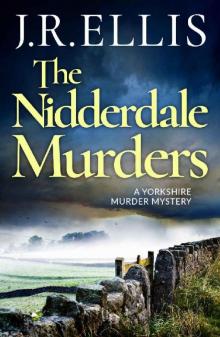 The Nidderdale Murders (A Yorkshire Murder Mystery)
The Nidderdale Murders (A Yorkshire Murder Mystery)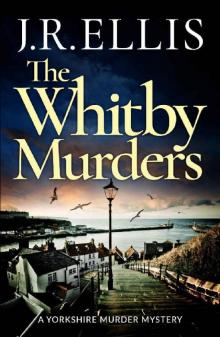 The Whitby Murders (A Yorkshire Murder Mystery)
The Whitby Murders (A Yorkshire Murder Mystery)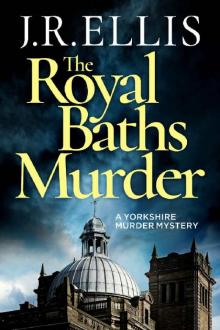 The Royal Baths Murder
The Royal Baths Murder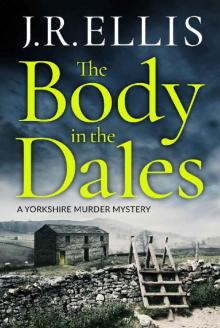 The Body in the Dales
The Body in the Dales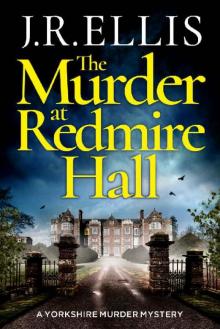 The Murder at Redmire Hall
The Murder at Redmire Hall